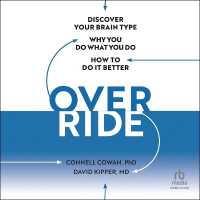Full Description
Enduring Issues in Special Education is aimed at any course in the undergraduate or graduate special education curriculum that is wholly or partly devoted to a critical examination of current issues in special education. The book organizes 28 chapters into seven sections using familiar structuring principles—what, who, where, how, when, why, and whither. Each section begins with an introduction that provides historical, legal, and theoretical background information and organizing commentary for the chapters that follow. The book's objective, in addition to informing readers about the issues, is to develop critical thinking skills in the context of special education. Key features include the following:
Dialectic Format - Each of the 28 chapters presents compelling reasons for addressing the issue at hand and specific ways to do so. Because each issue is written from different perspectives and focuses on a variety of aspects, readers are encouraged to weigh the arguments, seek additional information, and come up with synthesized positions of their own.
Organizing Framework - The book's seven sections have been arranged according to a scheme that is the essence of most investigative reporting and provides a coherent, easy-to-understand framework for readers.
Expertise - All chapters are written by leading scholars who are highly regarded experts in their fields and conclude with suggested readings and discussion questions for additional study.
Contents
Foreword
David Chard
Preface
Chapter 1: Introduction: Does Special Education Have Issues?
Tankersley, Lloyd, & Bateman
Section 1: What is Special Education?
Chapter 2: What is Special Education?
Bateman, Lloyd, Tankersley, & Brown
Chapter 3: What Makes Special Education Special?
T. Scruggs & M. Mastropieri
Chapter 4: What is Special Education Instruction?
P. C. Pullen & D. P. Hallahan
Chapter 5: What Should We Teach Students with Moderate and Severe Developmental Disabilities?
D. Browder
Chapter 6: Special Education as "Specially Designed Instruction": Ode to the Architecture of Information and the Message
Kame'enui
Section 2: Who Should Receive and Provide Special Education?
Chapter 7: Who Should Receive and Provide Special Education?
Bateman, Lloyd, Tankersley & Driver
Chapter 8: Cultural and Linguistic Diversity in Special Education
J. Klingner, B. Moore, A. Davidson, A. Boelé, A. Boardman, R. Figueroa , S. Annamma, N. Sager
Chapter 9: Who Should Receive Special Education Services and How Should Educators Identify Which Students are to Receive Special Education Services?
E. Lembke
Chapter 10: Co-teaching: Not All Special Educators Should Dance
M. P. Weiss
Chapter 11: Who Makes a Difference! Next Generation Special Education Workforce Renewal
M. Rock & B. Billingsley
Section 3: Where Should Special Education Happen?
Chapter 12: Where Should Special Education Take Place?
Bateman, Lloyd, Tankersley, & Alves
Chapter 13: Where Should Students with Disabilities Receive Their Education?
N. Zigmond
Chapter 14: Placements for Special Education Students: The Promise and the Peril
D. Huefner
Chapter 15: Place Values: What Moral Psychology Can Tell Us About the Full Inclusion Debate in Special Education
A. Wiley
Section 4: How Should Special Education be Practiced?
Chapter 16: How is Special Education Practiced?
Lloyd, Tankersley, Bateman, & Hirsch
Chapter 17: How Should Evidence-based Practices be Determined?
B. Cook
Chapter 18: The Connection between Assessment and Intervention: How Can Screening Lead to Better Interventions?
K. Lane & H. Walker
Chapter 19: How Should Learning Environments (Schools and Classrooms) be Structured for Best Learner Outcomes?
C. Greenwood
Chapter 20: How Should We Evaluate Whether Special Education Works?
M. Thurlow
Section 5: When Should Special Education Begin and End?
Chapter 21: When Should Special Education Start and End?
Bateman, Lloyd, Tankersley, & Dillon
Chapter 22: Children Should be Identified and Receive Special Education Services in Early Childhood
J. Carta
Chapter 23: When Does Special Education End?
M. Wehmeyer
Section 6: Why Do We Have Special Education?
Chapter 24: Why Should We Have Special Education?
Lloyd, Tankersley, & Bateman
Chapter 25: Why We Should Have Special Education
J. Kauffman
Chapter 26: How Should We Pay for Special Education?
T. Parrish
Chapter 27: Science Matters in Special Education
T. Landrum
Section 7: Whither Special Education?
Chapter 28: Whither Special Education?
Lloyd, Tankersley, Bateman, Balan, & Lloyd
Index








